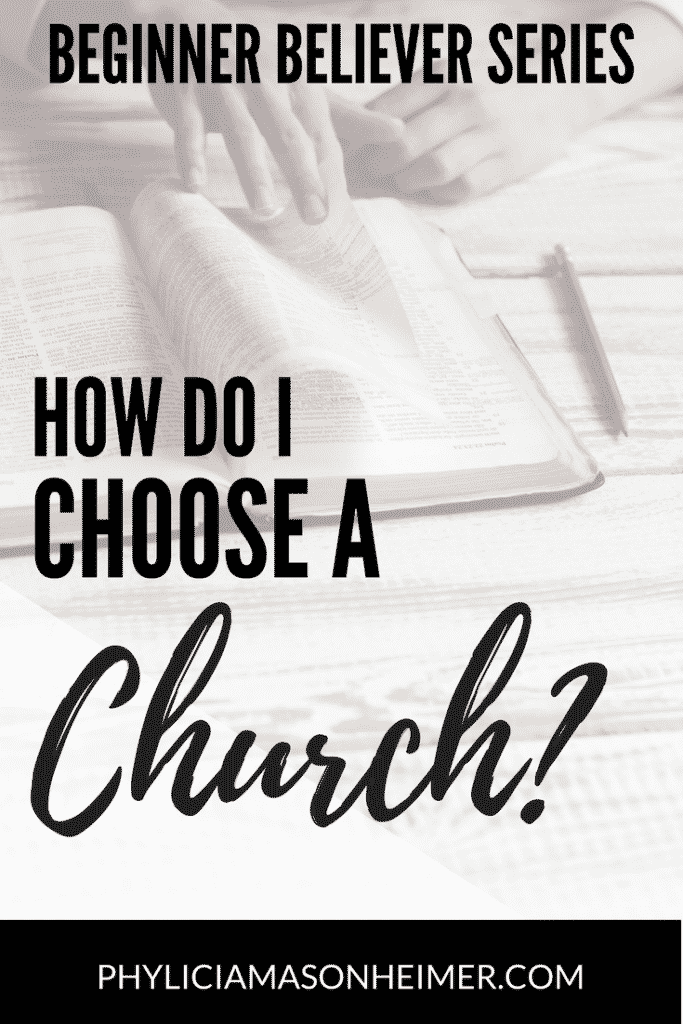The response I send to any email asking for counseling and help always includes encouragement to join a local church. As a blogger, people often reach out asking for accountability or online help – but that’s not my role. The local church is THE PLACE for you to grow, cultivate community, know and be known. Unfortunately, many believers think the church is optional (it’s not, as you’ll see in this post).
We arrive at this conclusion because we’ve been hurt by the church. I’ve been there. The church hurts people because it’s made up of hurting people. It’s made up of flawed, sinful, humans just like you! If you’ve ever in your life hurt someone, why are you surprised that someone in the church could also cause pain? We are all fallen people in need of a Redeemer, and only when we form healthy community can we grow past those hurts. As Jackie Hill Perry so wisely said, “Do you know who healed my church hurt? The church.”
The question comes: But how do I choose a church? How do you choose with so many different denominations?
As someone who has attended no less than six denominational churches (currently nondenominational) I have experience with this difficulty. I’ve lived in four states and been a member of at least five churches. I’ve attended regularly at PCA, Southern Baptist, charismatic/Pentecostal, Calvary Chapel, and nondenominational churches. I’ve visited Catholic, Methodist, Lutheran, Episcopalian, and many other churches, plus read the works of different denominational leaders. My takeaway? Denominations are the product of church splits over theological issues, but that does not make denominations “bad”. Denominations uniquely equip the church to reach people in specific ways that other denominations might not reach them.
A charismatic church offers an environment and passion for the Lord that another denomination might not.
A Baptist church offers a preaching style and community emphasis that another denomination might not.
So on and so forth. Denominations are GOOD.
If you’re wondering what a denomination is, it’s a “recognized autonomous branch of the Christian (Protestant) church”. The Roman Catholic church is independent of this. “Protestant” means non-Catholic, and this distinction began at the Reformation in 1517. Since the Reformation, the Protestant church has morphed and changed as the world’s needs and culture have changed, and as disagreements over doctrine or practice occurred. For example, a Nazarene, Wesleyan, or Methodist church will teach differently on the doctrine of salvation than a Presbyterian, Dutch Reformed, or Reformed Baptist church would. These denominations are still Protestant Christian churches; they have different interpretations of how the gospel is worked out.
Some “churches”, however, do not hold to orthodox Christian doctrine and are not denominations, but independent belief systems. Such would be Jehovah’s Witnesses and The Church of Latter Day Saints (LDS/Mormon). Though these factions read the Bible, they have additional “revelation” in the form of The Book of Mormon or, in the JW case, they have altered the biblical text to fit their view. More on the issues with Jehovah Witness theology here and Mormonism here. Listen to this podcast episode with a former Mormon.
Finding a church community is a process, and you have to be okay with discomfort. You will probably have to try a few churches before you find a body that you can connect with, and that’s okay. The most important part is to remember church is not designed just to serve you. It is a place for you to grow and learn, but it’s also a place for you to contribute and disciple. Do not look at churches from a consumer mindset. Look at them as groups of sisters and brothers alongside whom you will be laboring for the gospel.
This said, following are four questions to ask as you visit and choose a church.
Ask: Does this Church Preach the Word?
Does the church you’re visiting open the Bible at all during the sermon? This might seem basic, but a lot of churches teach topical messages that are little more than self-help with a Bible verse on the screen. You want a church that encourages you to KNOW the Word, and sets an example of this from the pulpit.
This can look several different ways. Some churches teach in a topical format, where the pastor preaches about a particular issue and uses Scripture to address the topic. Other churches use expository preaching, which means they go through a book of the bible or particular text and teach people what it means. They use the historical and literary context of the passage to draw out theological concepts which apply to our lives today (this process is called exegesis, and you can find out the difference between exegesis and exposition in this post).
While there is nothing wrong with topical preaching, it CAN be in danger of proof-texting the bible to support the pastor’s point. Proof-texting is when a teacher pulls out verses to support his message even though the CONTEXT of the verses had nothing to do with his topic. A teacher must be cautious with topical messages, and be sure the passage itself leads to the topic. The most important facet of any sermon is the Word of God, because this is what changes and challenges us. If a church is not challenging you to be in the Word and encouraging the community to understand it, look elsewhere.
Ask: Will I Be Supported in My New Faith in this Body?
The body of Christ is a community meant to help you grow in your faith, so you can, in turn, disciple others. You want a church which will help you in this growth. Small groups, Sunday classes, midweek bible studies – it can look different! What matters is that your new faith will be supported by the people around you.
I’m often asked theological or personal questions, as if I am a counselor to everyone who reads my blog. And while I can answer some things objectively, I can’t tell you how to handle the conflict with your best friend’s husband, or how to deal with your controlling mother in law. I’m not in your life! You need real community and Christian teachers to help you walk this out. They need to know you, and you need to be willing to be known.
That’s what church is meant to be. When I personally have to navigate a tough decision or a tricky situation, I have people who pray for me. I have mentors and wise women who give me counsel. I have a church family who supported us when we had our daughters and who helped my husband find a job when he lost his. I don’t have to seek help online because I have it right here, in my community! This is what God wants for you, too. But it takes work – which brings me to my next point.
Ask: Will I Commit to My New Community?
Joining a church is not about finding a place that serves you but about finding a place to serve. When you visit churches, ask yourself: “Am I willing to commit to serve this body, these people?” Are you going to plug into a small group? Are you ready to embrace people as they are, not judge them or look at them through Pharasaical eyes?
Too often we visit churches thinking about what OTHER people think of US. What if we did what we were supposed to – biblically – and looked at churches through the lens of, “What do I bring here?” I talk about this in You Are the Change Your Church Needs.
When you find a church body that preaches the Word and is actively discipling its attendees, you have to be ready to contribute. Begin looking for ways you can join in, link arms, and serve with the gifts God gave you. This could be in the preschool room or cleaning the church or attending a small group or all the above (I recommend finding a place to serve on Sundays, once a month or so, and also attending a midweek study or small group). Look at your church as a family where you are ready to contribute a part out of love.
Ask: Am I Being Reactive in My Church Choice?
I’m adding this point because I think it happens more often than we know. Rather than choose a church objectively, we choose them reactively. Perhaps you grew up in a hyper-Pentecostal church, and you don’t want anything to do with abused “spiritual gifts”, so you won’t even look at churches with more expressive worship. Or maybe you grew up in a strict Independent Baptist church and struggle with bitterness toward suits and ties, so you judge all “dressy” churches by appearance (even though that’s what you hate). Let each church body speak for itself. Do not assume, because you’ve seen something abused, that the next church will be abusive.
I have seen charismatic churches abuse spiritual gifts. I have seen Baptist churches judge by appearance. I have seen Methodist churches abandon the Word. Does this mean that all charismatic, Baptist, or Methodist churches are doing the same? No! Let each church body speak for itself.
Make a wise decision, led by God, not by emotional reaction or past experience.
Use “Theological Triage” to Determine Your Priorities
Remember the theological triage I mentioned at the beginning? Here is the article Albert Mohler wrote describing the first, second, and third tier issues to watch for:
Albert Mohler on first, second, and third-order doctrines
I hope this sheds some light on the process of choosing a church. It won’t be easy! But it will ALWAYS be worth it. Take it from someone whose done it many times. This body of believers is worldwide – a family. What a blessing!


